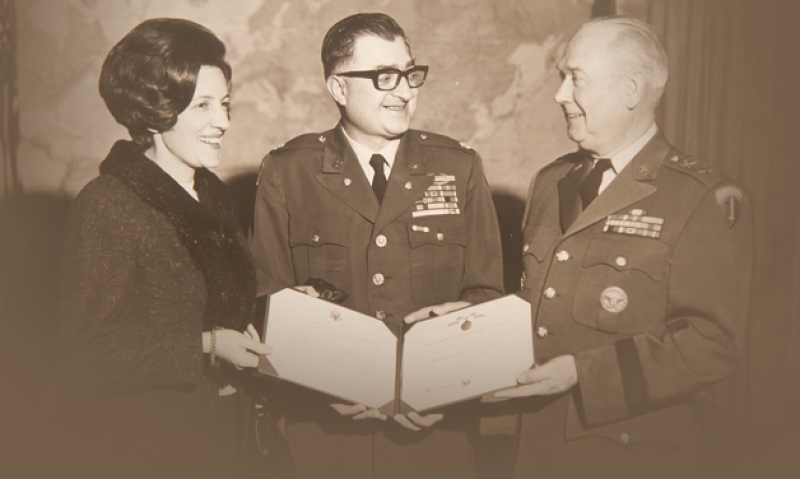
Richard Christian Jr., champion of Vietnam veterans in battle for Agent Orange and PTSD claims, dies after battle with cancer.
Richard Christian, Jr., who endured withering hostility from the Reagan administration for his meticulous and tireless work on behalf of Vietnam veterans exposed to Agent Orange, died of cancer at a Virginia hospital on Jan. 20. He was 80.
Christian was the first director of the Army’s Agent Orange Task Force, which later became the U.S. Army and Joint Services Environmental Support Group. He provided military records and analysis that were key to the groundbreaking Agent Orange research conducted by Columbia University professors Jeanne M. Stellman and Steven D. Stellman. Christian continued to press the Agent Orange issue as The American Legion’s Veterans Affairs & Rehabilitation Division deputy director after leaving the federal government in the late 1980s.
“Without Dick Christian, no veteran would be getting compensation for Agent Orange,” said Jeanne Stellman, professor emeritus and special lecturer at the Columbia University Mailman School of Public Health, and a member of The American Legion’s PTS-TBI Ad Hoc Committee. “He’s the person who kept the issue alive.”
For Christian, that meant working long hours and nights and weekends – and never backing down.
“He was dedicated to finding the reason that veterans coming home from Vietnam were getting sick,” said Don Hakenson, who worked for Christian and later became director of the Joint Services Environmental Support Group. “He was the right leader for the right organization at the right time. He had exceptional integrity.”
Christian was a records management specialist who served two tours in Vietnam before retiring from the Army as a lieutenant colonel. The Pentagon sent him back to Vietnam as a civilian in the early 1970s to retrieve military records as the United States prepared to pull out of Southeast Asia. Christian recovered thousands of records that his group used to reconstruct U.S. troop exposure to the more than 20 million gallons of Agent Orange sprayed during the war.
“He was everyone’s go-to person on Agent Orange, including the American Legion, and he never took credit for it,” Stellman said.
Christian’s willingness to provide information to scores of veterans who were trying to prove Agent Orange exposure set him apart from other government officials, said John Sommer, former executive director of The American Legion’s Washington office. “He believed that people who had served their country in the armed forces should be compensated for the disabilities and diseases they suffered as a result of that service,” Sommer said.
“At a time when Vietnam veterans weren’t treated very well by the VA, here was a guy who tried to make sure they got a fair shake in the disability compensation system,” said Bart Stichman, joint executive director of the National Veterans Legal Services Program, which has represented Agent Orange victims since the 1970s. “That took courage.”
Christian became the Defense Department’s representative to the Agent Orange Working Group assembled by the Reagan White House. His work made him a target for intense criticism from administration officials who wanted to derail Agent Orange exposure studies even as Vietnam veterans developed non-Hodgkin’s lymphoma, soft-tissue sarcoma and other diseases at an alarming rate.
“The White House and the executive agencies were out to kill the studies,” Stellman said. “It was a no-holds barred situation.”
Christian went head-to-head with the Centers for Disease Control, which opposed an Agent Orange epidemiological study on the grounds there wasn’t sufficient data. “At the same time, Christian is saying, ‘We’ve got good records as to where the troops were and where they sprayed,’” Stichman said. “How could the VA ignore its obligation to assist the veteran if he was saying we can help get that information?”
The epidemiological study was never conducted. But Christian persevered and his Congressional testimony later helped generate support for the Stellmans’ study. “We could not have developed our exposure methodologies without him,” Jeanne Stellman said.
Christian also was called upon to search the Vietnam records he retrieved for evidence to support veterans post-traumatic stress claims beginning in the early 1980s.
He left the Joint Forces Environmental Support Group in 1988. Christian continued his work on Agent Orange and post-traumatic stress disorder as deputy director of VA&R for The American Legion from 1989 to 1995. He also helped families of POW/MIAs and oversaw the Legion’s Vietnam Veterans Family Assistance Program. “There is so much that would not have happened if not for Dick Christian,” Sommer said.
Christian also had a distinguished record as a soldier. Born Feb. 26, 1931 in Newark, N.J., he lied about his age and joined the Army in 1946 when he was 15. He went to Korea as a platoon leader with the 7th Infantry and was wounded Sept. 26, 1952, according to his wife, Julita Christa Christian. The Chinese pounded Christian’s platoon with an estimated 500 artillery and mortar rounds before trying to overrun the hill they were holding. Christian refused to be evacuated until the enemy withdrew after six hours of hand-to-hand combat. He was belatedly recognized for his heroism with the Silver Star in October 2000, Julita Christa said.
Christian met and married his first wife during a deployment to Austria. The couple had a son, Richard Christian III. Adelaide Christian died of cancer in 1963. Christian met Julita Christa Arzt in Heidelberg, Germany, a year later. They were married in 1965 and returned to the United States in 1972 and settled in Virginia. The couple had two daughters, Karin Christian and Melanie Hendricks.
Christian also is survived by three grandchildren.
Burial will be at Arlington National Cemetery on April 26.
- Veterans Benefits

